Related Research Articles

Don Quixote, the full title being The Ingenuous Gentleman Don Quixote of La Mancha, is a Spanish novel by Miguel de Cervantes. It was originally published in two parts, in 1605 and 1615. Considered a founding work of Western literature, it is often said to be the first modern novel. The novel has been labelled by many well-known authors as the "best book of all time" and the "best and most central work in world literature". Don Quixote is also one of the most-translated books in the world and one of the best-selling novels of all time.

Henry Purcell was an English composer of Baroque music, most remembered for his more than 100 songs; a tragic opera, Dido and Aeneas; and his incidental music to a version of Shakespeare's A Midsummer Night's Dream called The Fairy Queen.

Miguel de Cervantes Saavedra was a Spanish writer widely regarded as the greatest writer in the Spanish language and one of the world's pre-eminent novelists. He is best known for his novel Don Quixote, a work considered as the first modern novel. The novel has been labelled by many well-known authors as the "best book of all time" and the "best and most central work in world literature".
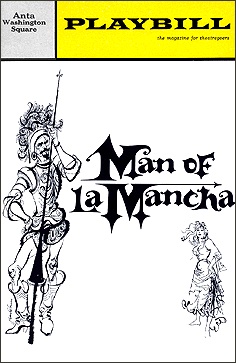
Man of La Mancha is a 1965 musical with a book by Dale Wasserman, music by Mitch Leigh, and lyrics by Joe Darion. It is adapted from Wasserman's non-musical 1959 teleplay I, Don Quixote, which was in turn inspired by Miguel de Cervantes and his 17th-century novel Don Quixote. It tells the story of the "mad" knight Don Quixote as a play within a play, performed by Cervantes and his fellow prisoners as he awaits a hearing with the Spanish Inquisition. The work is not and does not pretend to be a faithful rendition of either Cervantes' life or Don Quixote. Wasserman complained repeatedly about people taking the work as a musical version of Don Quixote.
John Eccles was an English composer.
Peter Anthony Motteux was a French-born English author, playwright, and translator. Motteux was a significant figure in the evolution of English journalism in his era, as the publisher and editor of The Gentleman's Journal, "the first English magazine," from 1692 to 1694.
This article contains information about the literary events and publications of 1700.
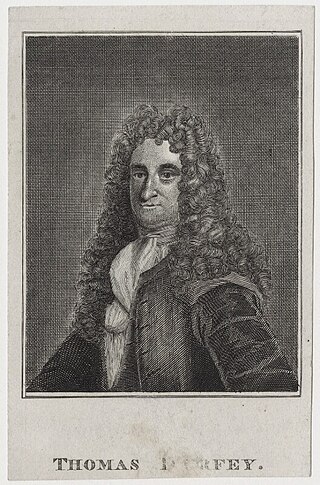
Thomas d'Urfey was an English writer and playwright. He wrote plays, songs, jokes, and poems. He was an important innovator and contributor in the evolution of the ballad opera.
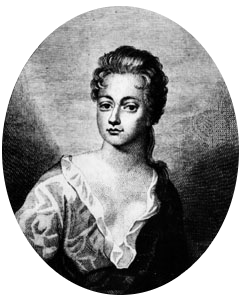
Anne Bracegirdle was an English actress and soprano. Most of the plays she performed in involved singing as well as acting. She often performed music written for her by the composer John Eccles, and also sung music written for her by Henry Purcell. She became particularly well known for the song "I burn" which Eccles originally wrote for Bracegirdle to perform in Thomas D'Urfey's play The Comical History of Don Quixote (1694). She also sang music by Eccles in the play The Richmond Heiress (1693) and in William Congreve opera The Judgment of Paris. In 1706 she starred in Giuseppe Fedeli's opera The Temple of Love.
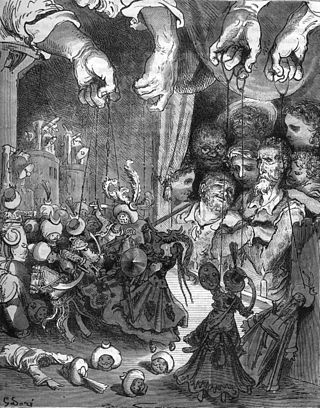
El retablo de maese Pedro is a puppet-opera in one act with a prologue and epilogue, composed by Manuel de Falla to a Spanish libretto based on an episode from Don Quixote by Miguel de Cervantes. The libretto is an abbreviation of chapter 26 of the second part of Don Quixote, with some lines added from other parts of the work. Falla composed this opera "in devoted homage to the glory of Miguel de Cervantes" and dedicated it to the Princess de Polignac, who commissioned the work. Because of its brief length by operatic standards, its very challenging part for a boy opera performer, and its use of puppets, it is not part of the standard operatic repertoire.
Don Quixote, fully El ingenioso hidalgo Don Quijote de la Mancha, is a classic novel by Miguel de Cervantes Saavedra, originally published in two parts, in 1605 and 1615.
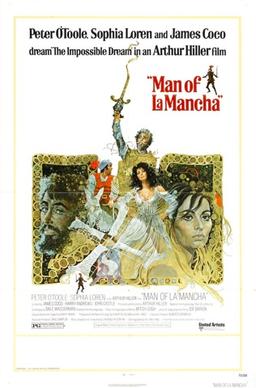
Man of La Mancha is a 1972 film adaptation of the Broadway musical Man of La Mancha by Dale Wasserman, with music by Mitch Leigh and lyrics by Joe Darion. The musical was suggested by the classic novel Don Quixote by Miguel de Cervantes, but more directly based on Wasserman's 1959 non-musical television play I, Don Quixote, which combines a semi-fictional episode from the life of Cervantes with scenes from his novel.
The Judgment of Paris is an operatic libretto written by William Congreve. It was set by four British Baroque composers – John Weldon, John Eccles, Daniel Purcell and Gottfried Finger – as part of a music competition held in 1700-1701. Thomas Arne later composed a score to the libretto in 1742.

Baroque music of the British Isles bridged the gap between the early music of the Medieval and Renaissance periods and the development of fully fledged and formalised orchestral classical music in the second half of the eighteenth century. It was characterised by more elaborate musical ornamentation, changes in musical notation, new instrumental playing techniques and the rise of new genres such as opera. Although the term Baroque is conventionally used for European music from about 1600, its full effects were not felt in Britain until after 1660, delayed by native trends and developments in music, religious and cultural differences from many European countries and the disruption to court music caused by the Wars of the Three Kingdoms and Interregnum. Under the restored Stuart monarchy the court became once again a centre of musical patronage, but royal interest in music tended to be less significant as the seventeenth century progressed, to be revived again under the House of Hanover. The Baroque era in British music can be seen as one of an interaction of national and international trends, sometimes absorbing continental fashions and practices and sometimes attempting, as in the creation of ballad opera, to produce an indigenous tradition. However, arguably the most significant British composer of the era, George Frideric Handel, was a naturalised German, who helped integrate British and continental music and define the future of music in the United Kingdom.
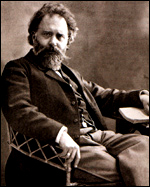
Don Quixote, Op. 50 is an opera in three acts by Wilhelm Kienzl. The libretto, written by the composer, is based on the novel by Miguel de Cervantes.

The Female Quixote; or, The Adventures of Arabella is a comedic novel by Scottish writer Charlotte Lennox imitating and parodying the ideas of Miguel de Cervantes' Don Quixote. Published in 1752, two years after she wrote her first novel, The Life of Harriot Stuart, it was her best-known and most-celebrated work. It was approved by both Henry Fielding and Samuel Richardson, applauded by Samuel Johnson, and used as a model by Jane Austen for Northanger Abbey. It has been called a burlesque, "satirical harlequinade", and a depiction of the real power of females. While some dismissed its protagonist Arabella as a coquette who simply used romance as a tool, Scott Paul Gordon said that she "exercises immense power without any consciousness of doing so". Norma Clarke has ranked it with Clarissa, Tom Jones and Roderick Random as one of the "defining texts in the development of the novel in the eighteenth century".

"Rinconete y Cortadillo" is one of the twelve short stories included in Novelas Ejemplares, by Spanish writer Miguel de Cervantes. It describes the comical adventures of two petty criminals as they travel to Seville and are then taken in by the city's thieves' guild. Seville at the time was a rich city with marked social contrasts, being the entrepôt of Spain and the new world of the Americas.
The Richmond Heiress is a 1693 comedy play by the English writer Thomas D'Urfey.

The Married Beau or The Curious Impertinent is a 1694 comedy play by the English writer John Crowne. It is inspired by a passage from Miguel de Cervantes's Don Quixote. Incidental music was composed by Henry Purcell.
References
- ↑ http://www.letrs.indiana.edu/cgi-bin/eprosed/eprosed-idx?coll=eprosed;idno=P2.0294%7C English Prose Drama: The Comical History of Don Quixote
- ↑ Olive Baldwin; Thelma Wilson (2001). "Bracegirdle, Anne". Grove Music Online. Oxford University Press. doi:10.1093/gmo/9781561592630.article.43379.
- 1 2 https://www.amazon.com/dp/B000000UL1%7C "Don Quixote: The Musical"
- ↑ "Music in the Provinces: Bath". www.jstor.org. JSTOR 922789.
- ↑ "Don Quixote - The Musical". www.medieval.org.
- ↑ "Radio 3 Programmes - Drama on 3, Don Quixote, by Thomas D'Urfey". BBC. 2009-11-22. Retrieved 2010-07-26.
- ↑ http://www.radiodramareviews.com/id370.html%7C Don Quixote: The Musical